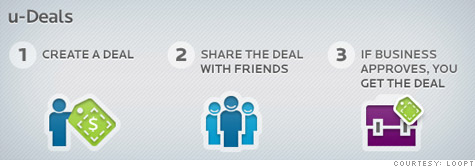Search News

Loop's new U-Deals offering lets customers request the deals they want.
NEW YORK (CNNMoney) -- There's a new front in the daily-deals battle: The fight to be the first to successfully blow up and reinvent the business model.
Groupon got big fast as the field's most prominent pioneer, but its approach is now drawing fire from several angles. Businesses are questioning whether bargain-hunting buyers actually become loyal customers, customers are overwhelmed by a flood of offers, and literally hundreds of rivals -- not to mention Facebook and Google (GOOG, Fortune 500) -- are plying the trade. As Groupon prepares to go public, all that emerging competition is a key risk.
"The current model of the big daily deal is unsustainable for big businesses," says Rocky Agrawal, a product strategist who works closely in the space and has written extensively about its pitfalls.
So this week, several sites went live with new twists on the daily deal.
Location-based networking service Loopt launched a personalized deal-creation service, U-Deals.
U-Deals lets users create their own fantasy deals and share them with friends. As the user rallies a team around the deal, Loopt contacts the target business to see if it will play ball.
The first u-Deal was a $100 voucher for Virgin America for $35. The airline approved the deal, which sold out within hours.
Fledgling startup Ringleadr launched a similar service on Thursday. Like Loopt's u-Deals, the site lets users to suggest their own deals for businesses they're interested in.
"It's how daily deal sites should have always been -- a place where like-minded consumers could band together to influence local businesses," says Ringleadr founder Mike Davis."This is the natural evolution of the daily deal industry, where local deals intersect with social networking."
But Agrawal thinks that model could run into the same problem Groupon is hitting: Merchants that offer discounts don't necessarily get new customers in return for them.
"You're most likely to request deals from places you already go to," he says. "Businesses don't want to offer large discounts to existing customers. That's one of the biggest risks of running a Groupon."
Loopt CEO Sam Altman counters that one of the strongest ways for a brand to attract new customers is for existing fans to draw in their friends.
"It's that saying, 'Hey, I love this brand, you've got to try it,'" he said.
Check-in service Foursquare is also relying on social-networking buzz to power a fresh approach to deals.
On Thursday Foursquare rolled out a national partnership with American Express (AMEX) to offer card holders discounts when they check in with participating merchants. The pair road-tested the approach earlier this year at the South by Southwest festival in Austin, offering $5 credits for spending money at local businesses.
National retailers Sports Authority and H&M are Foursquare's launch partners; several restaurants in Foursquare's hometown, New York, are also offering deals. The deals are "pre-loaded" onto the shopper's Amex card through Foursquare's mobile app, sparing merchants from having to track stacks of coupons.
But there's one way in which Foursquare's new deals approach is old-fashioned: It's a money-loser. Foursquare isn't taking a cut. The company says its payoff will come later as it fine-tunes and expands the program. ![]()